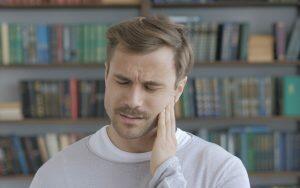The typical common cold can last anywhere from seven to ten days. Considering that adults on average suffer from two to three colds each year, that’s a lot of congested misery. But did you know that tooth pain is a common cold symptom as well? Surprised? While it might seem strange that a common illness like a cold or the flu can also cause discomfort in your mouth, there are some interesting reasons colds and teeth are related. Here’s what you need to know about colds, flu, and tooth pain, along with tips to help you cope.
Common Cold And Flu Symptoms
The common symptoms of cold and flu include:
- Fever or feeling feverish / chills
- Cough
- Sore throat
- Runny or stuffy nose
- Muscle or body aches
- Headaches
- Feeling tired
The main difference between the two is that with a cold you tend to have a stuffed-up, runny nose, and the flu usually includes fever and achiness.
Nasal Congestion
A big reason for tooth pain during a cold is the nasal congestion that typically occurs. We’ve all been there. Trying to sleep and rest with a stuffy nose can make you feel like you’re suffocating. Your natural response is to then breathe through your mouth. When you do this, obviously your mouth gets dry. Lacking proper saliva flow, dry mouth can also be exacerbated by typical over-the-counter cold medication, like decongestants and antihistamines.
Dry mouth can make it easier for oral bacteria to grow, which then increases the risk of tooth decay and gum disease, because you don’t have the proper flow of saliva to keep that bacteria from settling in. Therefore it’s very important to stay hydrated when you have a cold. Having a dry mouth also contributes to a sore throat, making it hard to chew and swallow, which may in turn make you want to avoid foods and drinks — the very nourishment your body needs to get batter. It’s a vicious cycle. Here are some tips to help avoid all these problems:
- Take Decongestants: Use nasal decongestants to keep your nasal passages as clear as possible, which allows you to keep breathing through your nose. Although this can contribute to dry mouth, clear breathing will at least avoid making it worse, as you won’t have to breathe through your mouth anymore.
- Saline Nasal Spray: Nasal sprays offer an excellent, natural way to keep nasal passages and sinuses clear, which will reduce congestion as well as lower the risk of sinus infection.
- Water: Make sure you sip water continuously to keep your mouth lubricated and your body hydrated.
- Sugar-Free Cough Drops: Suck on sugar-free cough drops as they can help keep saliva flow moving. They can also help moisten your throat and soothe soreness or discomfort.
- Hot Showers: Hot showers produce steam that can help loosen congestion in the sinuses so you can blow out mucous into a tissue.
Try these tips to not only help prevent dry mouth but to make yourself feel better in general.
Sinus Pain And Tooth Pain
Now, how does all this result in tooth pain? When your sinuses are inflamed due to a cold or flu, it can also cause pain in your upper teeth, because the upper teeth are located very close to your sinus area. When this happens, you may have a sinus infection called sinusitis, which can be a result of either the cold virus or a bacterial infection. One of the symptoms of sinusitis is pain and pressure in your upper back teeth, again because these teeth live very close to your sinuses. Some other signs your tooth pain is related to your cold or a sinus infection are:
- Thick yellow/green mucous discharge from the nose
- Discharge dripping into the throat (post-nasal drip)
- Throat pain
- Pressure in the eyes, nose, and cheeks
- Reduced sense of taste and smell
- Headache
Generally, if you experience pain in all your upper back teeth and not just one, it is a sign your pain is connected to your sinuses. However, if you are not sure about the source of your tooth pain you can speak to our team to rule out the possibility it is in fact a tooth-related problem. Just keep in mind if it is a sinus infection and it becomes serious you will need antibiotics.
Ear Infection And Tooth Pain
Your sinuses are not the only areas under attack when you have a cold. Your ears can also become infected, causing lasting pain or pressure in the upper molars just like with a sinus infection. Signs of an ear infection include:
- Temperature of 38C or above
- Hearing difficulty
- Ear discharge
- A feeling of pressure in your ear(s)
- Itching and irritation inside your ear(s)
- Crusty skin or build up around the ear(s)
Ongoing pain in your teeth or jaw when you have a cold or flu is most likely related to a sinus or ear infection.
Tips To Avoid Tooth Pain From Cold Or Flu
When you have a cold or flu you probably aren’t thinking too much about oral care. However, if you keep the following tips in mind you can reduce the chances of experiencing tooth pain along with all your other cold or flu symptoms:
- Brush Your Teeth: Although it’s the last thing on your mind, continuing to brush your teeth twice a day will assist in keeping your mouth moist.
- Peroxide-Free and Alcohol-Free Mouthwashes: Rinse and gargle with mouthwash to help prevent dry mouth and also kill germs in your mouth and throat.
- Drink Water: Stay hydrated by drinking only water, because sipping on sugary beverages like pop or sports drinks promotes bacteria growth which can lead to tooth decay.
- Sugar-Free Lozenges: As mentioned above, choose sugar-free cough drops and throat lozenges. If they’re not sugar-free, it’s just as bad as chewing on candy.
- Rinse After Vomiting: If you experience vomiting, don’t brush your teeth right away. Instead, rinse your mouth out well with water and spit it out to remove harmful acids that can lead to tooth decay. After 30 minutes you can then brush.
- Replace Your Toothbrush: Buy a new toothbrush once you are feeling better as your old bristles can still harbour bacteria and germs from your illness.
- Clean Your Cup: Make sure you also change the cup you used in the bathroom while you were ill.
Follow these tips, and keep up with your normal dental routine as much as possible while you are laid up with cold or flu symptoms, and perhaps you can avoid the tooth pain that sometimes comes along with it.
If you have any concerns about tooth pain or your oral health in general during cold and flu season, give us a call at 905-775-5307 or request an appointment by clicking here.
